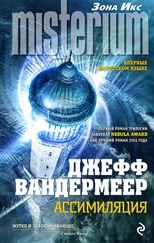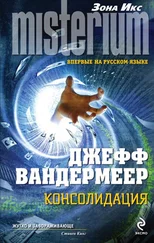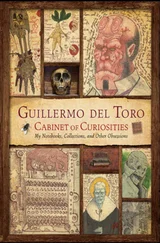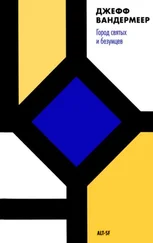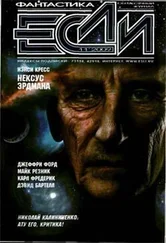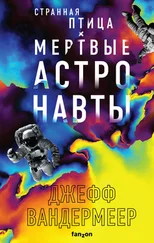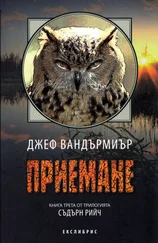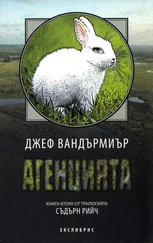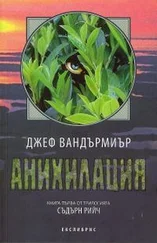Джефф Вандермеер - The Thackery T. Lambshead Cabinet of Curiosities
Здесь есть возможность читать онлайн «Джефф Вандермеер - The Thackery T. Lambshead Cabinet of Curiosities» весь текст электронной книги совершенно бесплатно (целиком полную версию без сокращений). В некоторых случаях можно слушать аудио, скачать через торрент в формате fb2 и присутствует краткое содержание. Жанр: Фэнтези, на английском языке. Описание произведения, (предисловие) а так же отзывы посетителей доступны на портале библиотеки ЛибКат.
- Название:The Thackery T. Lambshead Cabinet of Curiosities
- Автор:
- Жанр:
- Год:неизвестен
- ISBN:нет данных
- Рейтинг книги:5 / 5. Голосов: 1
-
Избранное:Добавить в избранное
- Отзывы:
-
Ваша оценка:
- 100
- 1
- 2
- 3
- 4
- 5
The Thackery T. Lambshead Cabinet of Curiosities: краткое содержание, описание и аннотация
Предлагаем к чтению аннотацию, описание, краткое содержание или предисловие (зависит от того, что написал сам автор книги «The Thackery T. Lambshead Cabinet of Curiosities»). Если вы не нашли необходимую информацию о книге — напишите в комментариях, мы постараемся отыскать её.
The Thackery T. Lambshead Cabinet of Curiosities — читать онлайн бесплатно полную книгу (весь текст) целиком
Ниже представлен текст книги, разбитый по страницам. Система сохранения места последней прочитанной страницы, позволяет с удобством читать онлайн бесплатно книгу «The Thackery T. Lambshead Cabinet of Curiosities», без необходимости каждый раз заново искать на чём Вы остановились. Поставьте закладку, и сможете в любой момент перейти на страницу, на которой закончили чтение.
Интервал:
Закладка:
“Float? Live? Glow?” He shrugged. “Curious, no?” This response disappointed me. It was unlike a man of science to pass up a chance to explain away the world. As if he knew my thoughts, he smiled. “Even in this century, there are still wonders beyond explanation. They are rare, but they do exist, and it has been my hobby, I suppose you could say, to collect all the world’s true curios, as you will see. But no more words for now unless prompted; it disrupts the process!”
We continued through the hallway, and the will-o’-the-wisps grew brighter as we walked through the cabinet until we entered a dark chamber, empty but with the exception of two worn Louis XVI chairs.
“Ah, now we can really begin.”
He sat in one chair and gestured for me to occupy the other. The will-o’-the-wisps floated out of our hands and hovered between our eyes. They undulated, glowing and dimming in tune with my heartbeat that swooshed through my ears.
“I want you to watch the wisps,” he whispered, “and tell me: have you experienced these following symptoms: soaring soul, existential exigency, speaking in cryptically symbolic metaphor, vertigo caused by sublimity, vision heightened by chiaroscuro, dead-dwelling, or head-swelling?”
“Yes,” I said.
“To all?”
“Yes.”
“Hmmmm . . .” His disbelieving expression ebbed into a dare-to-hope.
The two will-o’-the-wisps glowed blindingly blue and I became dizzy and hot, and the doctor and the wisps became double-exposed, and somehow I was split twain by the sides until there were two of me. One sat in front of Lambshead and the undulating wisps, while the other, conscious and seeing, was free to traverse the room.
“Do you suffer from daydreaming reflex with reveries that include blackbirds, scents of an unseen censor, or aberrant alliterative applications?”
Beady eyes glowed from the wisps, and wings fluttered by my ears. I smelled dried flowers and cut grass, upturned earth and the fading waft of fabric softener. I looked at my sitting-self in the chair and heard her indolent “Yes.”
“What else do you see?”
The wisps left Lambshead and my sitting-self to illuminate the corners of the empty room where ebon bookcases grew from the walls and within them appeared objects that my sitting-self described:
Jaundiced blueprints of a non-Euclidian pendulum; a stuffed cat with a hissing throat encircled in white fur; a fractured skull chilling a broken bottle of blood-thick sherry; a tailor’s mannequin wearing a white, blood-soaked and dirt-streaked dressing gown, its neck a splintered pine plank engraved with claw marks.
Beside the cases stood a stuffed gorilla. I couldn’t help but touch its fur, which turned to feathers and fluttered to the ground, revealing the tarred and malformed skeleton of a dwarf. Through its eye socket, a gold beetle climbed out and over to a shelf that held a jar of putrescence and nestled itself in an open locket containing a strand of blond hair speckled black.
At the very bottom of the bookshelves were several jorums filled with animated landscapes: tiny ships thrusting within a maelstrom pint; a littoral liter with a weeping willow tree overlooking a craggy shore; and a quart of electrified clouds in the shape of women hovering over an abandoned manse, crying dust and leaves.
“What are these?” I asked Lambshead. From his chair, he looked up to the ceiling, unsure of my voice’s source.
“What do they look like?” he asked my sitting-self. I heard her describe the jorums, and he smiled.
“Mood,” he spoke into the ether. “They are jars of mood.”
I squatted at the bookshelf and selected one containing the cosmos. Several minute stars swam like strawberry seeds in a phosphorescent jam that churned and congealed into a sun that heated the glass. It burned my hand and I dropped it, and, with a loud bang, it exploded on the floor, incinerating all within the jar and melting the glass, which pooled and cooled into a Bristol blue fetus.
Before I could retrieve it, I heard Lambshead command me awake, and suddenly I was back in the chair—whole—and subject to his sherry-sweet breath. The bookshelves, the taxidermy, curios, and jars were all gone, but on the ground remained the glass fetus, which the doctor rushed to rescue.
He coddled it in his palm. “This—this is what ails you!”
“A child?”
“Of the imagination, yes. You thought you had a disease of influence, but it is much, much worse. You have a disease of the imagination, probably from too much Poe. But don’t worry, this here is your cure.”
“I thought you said it was what ails me?”
“You are cured,” he said. “And I have another child for my cabinet!” He waved the wisps away and they dimmed in rejection. Before I could ask what the other children were, he all but rushed me from the basement and out of his house.
I did not see where he kept the Dark Room’s offspring, and I suppose now I never will, but after I left Lambshead and his curious cabinet, I admit I felt a lot lighter. Before booting me off the steps, he gave me permission to write of my disease, which seemed to ameliorate my condition more.
Having been able to resume a normal, perhaps even an extra-normal life, I am forever indebted to that cabinet and to Dr. Lambshead. When I read of his death, just three years later, I mourned not only the loss of that great man but also of his Dark Room and its soul-ware nursery that has inevitably become overexposed and returned to the ether.
2003: The Pea
Related to Gio Clairval in 2008 at a Parisan Café, by Dr. Lambshead’s Housekeeper
Dr. Lambshead had told me not to dust the object resting on the third shelf from the floor, a collector’s item hidden behind a maroon curtain. In my twenty years at the doctor’s service, I had never contravened an order. Nevertheless, my employer’s days being numbered, it seemed to me that I should redouble my efforts in keeping the basement spotless.
Behind the curtain stood a bell jar of oxide-stained glass, iridescent with blues, pinks, and greens, as tall as my forearm, protecting a Smyrna-red velvet cushion the size of a full-blossomed rose. Golden tassels hanging from a crown of braided trimmings strangled the cushion into the shape of a muffin, the top of which appeared to be decorated with an embroidery of silver-coloured human hair stitched at regular intervals to form a lozenge pattern.
On the cushion sat a perfectly preserved pea.
I gasped, suddenly aware of my staring at a piece of Dr. Lambshead’s secret collection, and lowered my gaze to examine the elegant pedestal. It was made of grey-veined marble carved into ovals framed by acanthus leaves. A slight suspicion of dust filled the carvings. After five seconds, I looked at the item again. How could a pea not shrink and shrivel, unless it was preserved in oil or in a vacuum? To judge by the colour, it was a young pea freshly spilled from its pod, full of water and life that made its skin turgid, ready to burst if squeezed between index finger and thumb.
My stomach clenched at the unprofessional thought. I concentrated on my task, passing my feather duster with the greatest attention on the delicate pedestal carvings, but my gaze wandered back to the pea. It had never happened before. In all those years, never had one single question about any of the objects crossed my mind. My deference to the doctor’s wishes had always been absolute.
Dr. Lambshead had become all my family after my parents died. No sensible person can lend credence to the cook’s rants; he attributes a selfish intent to each of the doctor’s good actions. It is untrue that my legal guardian discouraged my interest in humanities to secure the services of an unpaid employee. When a paralysing timidity forced me to abandon my studies at Oxford, the doctor restored my self-esteem by assuring me I was the only person he could trust to keep his ever-growing collection mildew-free. He had always treated me with consideration. And dust was our enemy.
Читать дальшеИнтервал:
Закладка:
Похожие книги на «The Thackery T. Lambshead Cabinet of Curiosities»
Представляем Вашему вниманию похожие книги на «The Thackery T. Lambshead Cabinet of Curiosities» списком для выбора. Мы отобрали схожую по названию и смыслу литературу в надежде предоставить читателям больше вариантов отыскать новые, интересные, ещё непрочитанные произведения.
Обсуждение, отзывы о книге «The Thackery T. Lambshead Cabinet of Curiosities» и просто собственные мнения читателей. Оставьте ваши комментарии, напишите, что Вы думаете о произведении, его смысле или главных героях. Укажите что конкретно понравилось, а что нет, и почему Вы так считаете.

